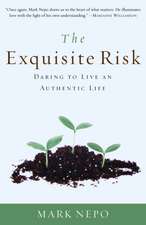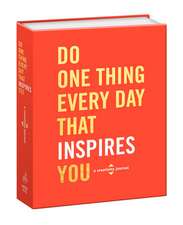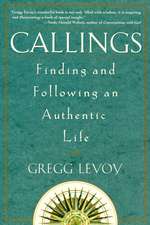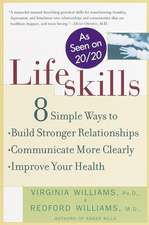The Confident Woman: How to Take Charge and Recharge Your Life
Autor Marjorie H. Shaevitzen Limba Engleză Paperback – 31 mai 2001
Marjorie Hansen Shaevitz has won national awards for her work in women's health and has enjoyed the success some people only dream of: a prosperous professional life; a long, happy marriage; two Stanford-educated children; and a bestselling book, The Superwoman Syndrome, which coined a term for a generation of women. Despite all of her accomplishments, however, she struggled with the issue of confidence. After conducting extensive research, she found that she was far from alone: Many women experience the paradox of enjoying success in their business and personal lives while lacking confidence in themselves.
The Confident Woman focuses on the issues that women face in growing up as girls in this society. Using a series of seven steps, complete with techniques and questions, Shaevitz presents an accessible and proven program that helps women regain their confidence. It is written for women of all ages, ending with an epilogue for mothers who want practical tips for raising confident daughters. In clear, concise prose -- filled with anecdotes and humor -- The Confident Woman focuses on what women say they want: practical advice that they can use now.
Preț: 120.05 lei
Nou
Puncte Express: 180
Preț estimativ în valută:
22.98€ • 24.97$ • 19.31£
22.98€ • 24.97$ • 19.31£
Carte disponibilă
Livrare economică 31 martie-14 aprilie
Preluare comenzi: 021 569.72.76
Specificații
ISBN-13: 9780609805343
ISBN-10: 0609805347
Pagini: 368
Dimensiuni: 153 x 230 x 24 mm
Greutate: 0.53 kg
Editura: Three Rivers Press (CA)
ISBN-10: 0609805347
Pagini: 368
Dimensiuni: 153 x 230 x 24 mm
Greutate: 0.53 kg
Editura: Three Rivers Press (CA)
Notă biografică
Marjorie Hansen Shaevitz holds a master's degree from Stanford University and is an executive coach and a practicing psychotherapist. She is also the chair of the National Advisory Panel for Stanford's Institute for Research on Women and Gender. She lives in La Jolla, California.
Extras
Introduction
WHO AM I TO BE TELLING YOU WHAT TO DO?
A book is, after all, nothing more than a personal letter to the world... at least to those who want to read it.
-- Anonymous
I can't remember when I didn't want to write this book. After a lifetime of experiencing little confidence, two separate, but related incidents led me to stop thinking about it and sit down to prepare, and eventually write The Confident Woman.
The first incident took place when a colleague of mine, Dr. Kim Yeager, chief of the California Office of Women's Health, asked me to give a presentation for an upcoming National Roundtable on Women's Health. The other presenters were going to be people who were considered "the experts" in their respective fields, so my immediate response was to tell her that I was sure that there were many others much better qualified than I to do such a presentation. Frankly, that was the truth. Nevertheless, Kim left the invitation open.
That evening I flew up to the San Francisco Bay Area to see my kids perform in a Stanford University improv program. Before the show, I went out to dinner with another colleague, Dr. Iris Litt, Director of Adolescent Medicine at the Stanford University School of Medicine. As we were sipping a glass of wine at a local cafÈ, I mentioned to Iris that a National Roundtable on Women's Health was going to be held in California and that she might want to get in touch with Kim Yeager about doing a piece on adolescent girls. Just as an idle aside, I mentioned that Kim had asked me to give the talk on women's mental health and then casually told her of my response.
What ensued was life-changing for me. Iris, who in spite of her remarkable accomplishments, is a very soft-spoken woman, took my hand in hers, looked me straight in the eye, and in an uncharacteristically, strong voice said: "Marjorie, don't you dare not accept this invitation! Don't you know that when asked to give presentations, even the most highly educated, most qualified women--both Ph.D.'s and M.D.'s--continually take themselves out of the arena. Predictably, they say no to invitations because they don't think they know enough, are good enough, are experienced enough, are prepared enough to speak on a subject. Even when they are experts in their fields, many women don't seem to have the confidence to do the job."
"On the other hand," she went on, "when most male Ph.D.'s or M.D.'s are asked to present, they say yes readily, whether or not they know anything about the subject!1 Hey, my friend, you've been offered a wonderful opportunity! You've got to do it. What do you have to lose?"
I was stunned. Iris' words both challenged me and gave me courage to do something that I would not otherwise have done. (Now that's a good friend!). So in spite of not having the extraordinary academic credentials of my fellow roundtable presenters, I decided to participate. With the help of a colleague, I spent six months relentlessly tracking down the research on women's mental health. Eventually we managed to put together a respectable presentation. At least it was effective enough to have the sponsoring organization ask us to give it again on two other occasions. I will never forget that experience because it forced me to succeed at something about which I had little confidence.
The second incident took place just after I gave the roundtable talk. One day a colleague of mine called to ask me to lecture on The Superwoman Syndrome to women faculty members at a major medical school. My non-confident side whispered, "Who, me? What could I possibly offer these brilliant women?" Then I thought back to the previous incident and Iris's encouragement. I realized that my colleague was asking me to speak on a topic about which I knew quite a lot. (After all, I was the author of the one and only book on the subject.) In spite of my initial trepidation, I said yes to her invitation.
Once again I relied on my trusty work orientation and decided that to feel comfortable talking before this high-powered group, I needed to know more about them and what their respective "Superwoman" issues were. As I agreed to do the talk, I also made arrangements to conduct interviews with about a dozen of the future audience members, all M.D.'s and/or Ph.D.'s. As I interviewed these extraordinary women, I was astounded at how many of them seemed to lack self-confidence. They said things like (and these are their EXACT words):
I keep thinking, I hope I'm good enough.
I just don't feel up to a lot of things...teaching, my research, being a good mother, keeping the household going.
I know I need to take better care of myself...I just can't...I'm worn to a frazzle; freaked out with too much to do and yet guilty and miserable when I try to take some time for me. I'm desperate for even a little bit of time alone.
I'm insecure, damn insecure, but pleazzzzzzze don't breathe a word of this to anyone.
I couldn't believe my ears! Here were some of the most accomplished women in the United States, women who enjoyed all the accoutrements of success--degrees, decrees, prestigious careers, expensive homes, children in the best schools, new Volvos in their parking spaces--yet, so many of them appeared to be lacking in confidence. And they were the cream of the crop...the top of the heap...the academic dream team!
So many questions popped into my head: If these uncommonly successful academics and physicians don't have confidence, who does? Does any woman? Do people fake confidence? (Hadn't I done that myself?) If there are women of real confidence, who are they and how did they get it? Why do others not have it? Is one born with it? What can a person do to develop it? It's not as if you can traipse down to your local grocery store, open up a mail-order catalogue, or even go onto the Internet to buy some (If it were only so easy!) I also thought about young girls and what we--as mothers, grandmothers, aunts, friends, teachers, mentors--can do to insure that they grow up having true confidence.
Right then and there I decided that I had to write this book.
From the Hardcover edition.
WHO AM I TO BE TELLING YOU WHAT TO DO?
A book is, after all, nothing more than a personal letter to the world... at least to those who want to read it.
-- Anonymous
I can't remember when I didn't want to write this book. After a lifetime of experiencing little confidence, two separate, but related incidents led me to stop thinking about it and sit down to prepare, and eventually write The Confident Woman.
The first incident took place when a colleague of mine, Dr. Kim Yeager, chief of the California Office of Women's Health, asked me to give a presentation for an upcoming National Roundtable on Women's Health. The other presenters were going to be people who were considered "the experts" in their respective fields, so my immediate response was to tell her that I was sure that there were many others much better qualified than I to do such a presentation. Frankly, that was the truth. Nevertheless, Kim left the invitation open.
That evening I flew up to the San Francisco Bay Area to see my kids perform in a Stanford University improv program. Before the show, I went out to dinner with another colleague, Dr. Iris Litt, Director of Adolescent Medicine at the Stanford University School of Medicine. As we were sipping a glass of wine at a local cafÈ, I mentioned to Iris that a National Roundtable on Women's Health was going to be held in California and that she might want to get in touch with Kim Yeager about doing a piece on adolescent girls. Just as an idle aside, I mentioned that Kim had asked me to give the talk on women's mental health and then casually told her of my response.
What ensued was life-changing for me. Iris, who in spite of her remarkable accomplishments, is a very soft-spoken woman, took my hand in hers, looked me straight in the eye, and in an uncharacteristically, strong voice said: "Marjorie, don't you dare not accept this invitation! Don't you know that when asked to give presentations, even the most highly educated, most qualified women--both Ph.D.'s and M.D.'s--continually take themselves out of the arena. Predictably, they say no to invitations because they don't think they know enough, are good enough, are experienced enough, are prepared enough to speak on a subject. Even when they are experts in their fields, many women don't seem to have the confidence to do the job."
"On the other hand," she went on, "when most male Ph.D.'s or M.D.'s are asked to present, they say yes readily, whether or not they know anything about the subject!1 Hey, my friend, you've been offered a wonderful opportunity! You've got to do it. What do you have to lose?"
I was stunned. Iris' words both challenged me and gave me courage to do something that I would not otherwise have done. (Now that's a good friend!). So in spite of not having the extraordinary academic credentials of my fellow roundtable presenters, I decided to participate. With the help of a colleague, I spent six months relentlessly tracking down the research on women's mental health. Eventually we managed to put together a respectable presentation. At least it was effective enough to have the sponsoring organization ask us to give it again on two other occasions. I will never forget that experience because it forced me to succeed at something about which I had little confidence.
The second incident took place just after I gave the roundtable talk. One day a colleague of mine called to ask me to lecture on The Superwoman Syndrome to women faculty members at a major medical school. My non-confident side whispered, "Who, me? What could I possibly offer these brilliant women?" Then I thought back to the previous incident and Iris's encouragement. I realized that my colleague was asking me to speak on a topic about which I knew quite a lot. (After all, I was the author of the one and only book on the subject.) In spite of my initial trepidation, I said yes to her invitation.
Once again I relied on my trusty work orientation and decided that to feel comfortable talking before this high-powered group, I needed to know more about them and what their respective "Superwoman" issues were. As I agreed to do the talk, I also made arrangements to conduct interviews with about a dozen of the future audience members, all M.D.'s and/or Ph.D.'s. As I interviewed these extraordinary women, I was astounded at how many of them seemed to lack self-confidence. They said things like (and these are their EXACT words):
I keep thinking, I hope I'm good enough.
I just don't feel up to a lot of things...teaching, my research, being a good mother, keeping the household going.
I know I need to take better care of myself...I just can't...I'm worn to a frazzle; freaked out with too much to do and yet guilty and miserable when I try to take some time for me. I'm desperate for even a little bit of time alone.
I'm insecure, damn insecure, but pleazzzzzzze don't breathe a word of this to anyone.
I couldn't believe my ears! Here were some of the most accomplished women in the United States, women who enjoyed all the accoutrements of success--degrees, decrees, prestigious careers, expensive homes, children in the best schools, new Volvos in their parking spaces--yet, so many of them appeared to be lacking in confidence. And they were the cream of the crop...the top of the heap...the academic dream team!
So many questions popped into my head: If these uncommonly successful academics and physicians don't have confidence, who does? Does any woman? Do people fake confidence? (Hadn't I done that myself?) If there are women of real confidence, who are they and how did they get it? Why do others not have it? Is one born with it? What can a person do to develop it? It's not as if you can traipse down to your local grocery store, open up a mail-order catalogue, or even go onto the Internet to buy some (If it were only so easy!) I also thought about young girls and what we--as mothers, grandmothers, aunts, friends, teachers, mentors--can do to insure that they grow up having true confidence.
Right then and there I decided that I had to write this book.
From the Hardcover edition.
Recenzii
"Three cheers to Marjorie for saying so eloquently what every woman needs to hear. The Confident Woman should be required reading for anyone wanting to make positive changes in her life -- it's also a must-read for every teenage girl!"
-- Jenny Craig, founder and president of Jenny Craig International
-- Jenny Craig, founder and president of Jenny Craig International
Descriere
Written for women of all ages, this book by the author of "The Superwoman Syndrome" provides women with the tools to unshackle, rescue, or recover their vital self-confidence, leading to a dramatically improved life.













